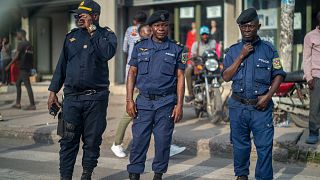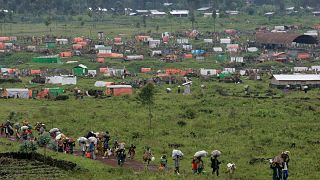Democratic Republic Of Congo
After fleeing the Kishishe massacre in the Democratic Republic of Congo's volatile east, the survivors recount how they fled to Kitshanga to a displaced peoples' camp, which has been home to many displaced people for over 20 years.
"We were told that many people died in Kishishe," says one woman who followed the river's path to escape the massacre with some of her children.
They saw horrors in their village of Kishishe fled and walked in fear and cold for dozens of kilometres to escape the M23 rebels who are backed by Rwanda, according to the UN.
An AFP team met Samuel, Tuyisenge, Eric, Florence and others on Friday in a camp for displaced people in the locality of Kitshanga, in the Masisi territory, where they arrived in recent days.
Depending on the route they took, they travelled 40 or 60 kilometres through the hills to arrive at this camp called Mungote, after fleeing the November 29 killings.
According to a preliminary U.N. investigation, at least 131 civilians were executed that day by the M23 ("March 23 Movement"), a predominantly Tutsi rebellion that has seized large swaths of Rutshuru territory, neighbouring Masisi, north of the North Kivu provincial capital, Goma, in recent months.
The rebels are also accused of rape, abduction and looting, committed against the civilian population in retaliation for an attack by mainly Hutu armed groups.
"The M23 rebels started shooting everywhere," said Samuel, a young man who said he saw six dead - three members of his family, including his older brother James, and three other residents of Kishishe.
"I decided to run away and it took me a week to get to Kitshanga on foot," he says.
Tuyisenge is a 30-year-old mother. "I was in church and I was able to escape. Some resisted and were killed. I saw nine dead," she says, with tears in her eyes.
"I have seven children, but I came here with three. The other four have disappeared and my husband, I have no news", she adds, surrounded by other women who also want to tell the terror they have experienced.
They have nothing, just the clothes they were wearing when they ran away.
A little further on, in the middle of the displaced persons' huts, Florence, 45 years old, explains that she walked for several days to get here. She has no news of her husband or two of her children. "In the camp, the one who takes pity on me gives me sweet potatoes," she says sadly.
Eric is haunted by the image of his older brother's two children who "came out of the house shouting 'there's shooting'". "They were shot right at the door and died on the spot", their names were Jacques and Musayi.
According to the Congolese government, UN experts and the American and Belgian diplomatic corps, Rwanda supports the M23. Kigali disputes this, accusing Kinshasa of supporting Hutu rebels, some of whom were involved in the 1994 genocide of Rwandan Tutsis.
The former colonial power Belgium tweeted a statement about the massacre.
It called on Rwanda "to cease all assistance to the M23 and to continue to use all the means at its disposal to persuade it to re-engage in a process of disarmament, demobilization and community reintegration."
There have been war-displaced people in Kitshanga for years, some having arrived at the time of a previous M23 offensive. The movement occupied Goma for about 10 days in late 2012, before being defeated the following year by the Congolese army supported by UN peacekeepers.
The M23 took up arms again late last year, blaming the Kinshasa government for not respecting commitments to demobilize its fighters.
According to its officials, the Mungote camp was already home to more than "40,000 households" and about 4,000 more arrived just recently.
"Up to four families are sleeping in a hut, men, women and children. People are dying," says Vumilia Peruse, vice president of the camp. "They arrive with nothing... The authorities must intervene as soon as possible to avoid a catastrophe," she said.
"We thought that this war was between soldiers and that we would be spared," comments Toby Kahunga, president of the civil society of the Bashali chiefdom (grouping of villages). "But they are killing people," he said, demanding that Rwandan President Paul Kagame "withdraw his men."












00:56
Peace talks between DRC and M23 rebels 'moving in the right direction'
11:17
Bridging the legal gap in Africa’s digital boom {Business Africa}
01:01
Trial of DRC's former Justice Minister Constant Mutamba postponed for two weeks
01:12
Eastern DRC tensions: UN points to Rwanda's role in AFC/M23 conflict
00:55
The Democratic Republic of Congo celebrates the centenary of Patrice Lumumba's birth
01:52
In Goma, solar power brings light and hope in Ndosho neighbourhood